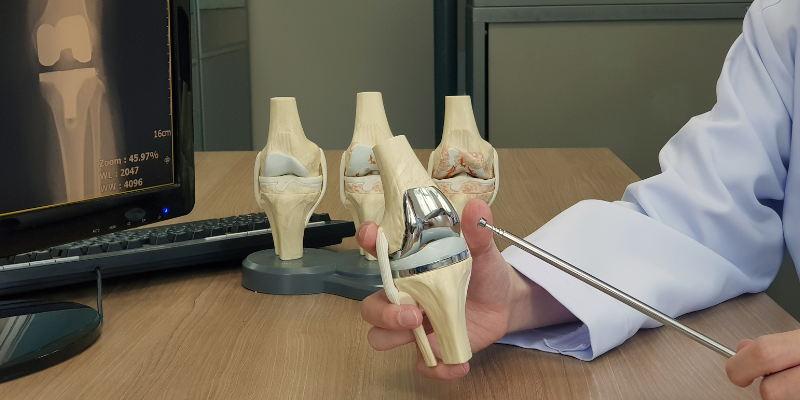Total Knee Replacement
Total Knee Replacement Treatment

Treatment Range Hospital in Hyderabad offers advanced Total Knee Replacement (TKR) surgery for patients suffering from osteoarthritis, rheumatoid arthritis, or knee joint damage due to injury or age-related degeneration. Our experienced orthopedic surgeons use the latest surgical techniques—including minimally invasive and computer-assisted methods—to ensure precise alignment, reduced pain, and faster recovery. We are recognized among the best hospitals for knee replacement surgery in Hyderabad.
Before surgery, each patient undergoes a comprehensive evaluation including physical exams, X-rays, and lab tests to determine the right treatment approach. The knee replacement procedure involves replacing the damaged joint surfaces with high-quality prosthetic components to restore mobility and reduce chronic pain. Our specialized post-operative rehabilitation programs help patients regain strength and resume daily activities quickly and safely.
If you’re looking for reliable Total Knee Replacement in Hyderabad, Treatment Range Hospital provides high-quality care with expert surgeons, modern infrastructure, and affordable packages. From pre-surgical consultation to complete rehabilitation, we are committed to improving your mobility and quality of life with personalized orthopedic care.
- Your 6 - Phase health Process
Your Complete Total Knee Replacement Journey
🩺Phase 1: Symptoms Identification
- Chronic knee pain during movement or rest
- Difficulty walking, climbing stairs, or standing
- Stiffness and limited range of motion
- Swelling, deformity, or knee instability
- Pain unrelieved by medications or physical therapy
🧪Phase 2: OPD Consultation with Orthopedic Surgeon
- Detailed physical examination of the knee
- Medical history and activity limitation assessment
- Imaging tests: X-rays, MRI, or CT scan
- Blood tests to rule out infections or other conditions
- Discussion of non-surgical vs. surgical options
📋 Phase 3: Causes
- Osteoarthritis – cartilage wear & tear from aging
- Rheumatoid arthritis – autoimmune joint inflammation
- Post-traumatic arthritis – injury-induced damage
- Genetic predisposition or obesity increasing knee stress
- Sports injuries or mechanical imbalance
🔪 Phase 4: Diagnosis & Surgical Planning
- Confirm joint damage through imaging
- Assess limb alignment and joint space loss
- Selection of appropriate implant type
- Pre-surgery optimization: weight loss, blood sugar control, cardiac clearance
💊 Phase 5: Treatment – Total Knee Replacement Surgery
- Damaged bone and cartilage removed
- Artificial implant placed for femur, tibia, and kneecap
- Surgery duration: ~1.5 to 2 hours under spinal/general anesthesia
- Early mobilization encouraged post-surgery
- Hospital stay: typically 2–4 days
💪 Phase 6: Post-Surgery Care & Recovery
- Physiotherapy begins within 24 hours
- Regular exercises to restore motion and strength
- Pain control with analgesics and anti-inflammatory meds
- Use of walker or cane for 2–6 weeks
- Full recovery in 3–6 months depending on age & fitness
- Regular follow-up visits and implant monitoring via X-ray
Insurance Support










- Why Choose Us
Why patients trust us with their care
- Patient Testimonials
Patient stories of care and recovery










- Frequently Asked Questions
Helping you understand Our healthcare
TKR is most commonly recommended for:
Osteoarthritis
Rheumatoid arthritis
Post-traumatic arthritis (due to injury)
Severe knee deformity or joint instability
You may need TKR if you experience:
Persistent knee pain at rest or during activity
Swelling and stiffness limiting movement
Difficulty walking, climbing stairs, or performing daily tasks
Poor response to medication, physical therapy, or injections
Most patients resume daily activities within 6 weeks. Full recovery, including regaining strength and flexibility, typically takes 3 to 6 months.
TKR implants are usually made of:
Metal alloys (e.g., cobalt-chromium, titanium)
High-grade plastic (polyethylene)
Sometimes ceramic components
The procedure usually takes 1.5 to 2 hours, followed by a short hospital stay (2–4 days depending on the patient’s health and recovery speed).